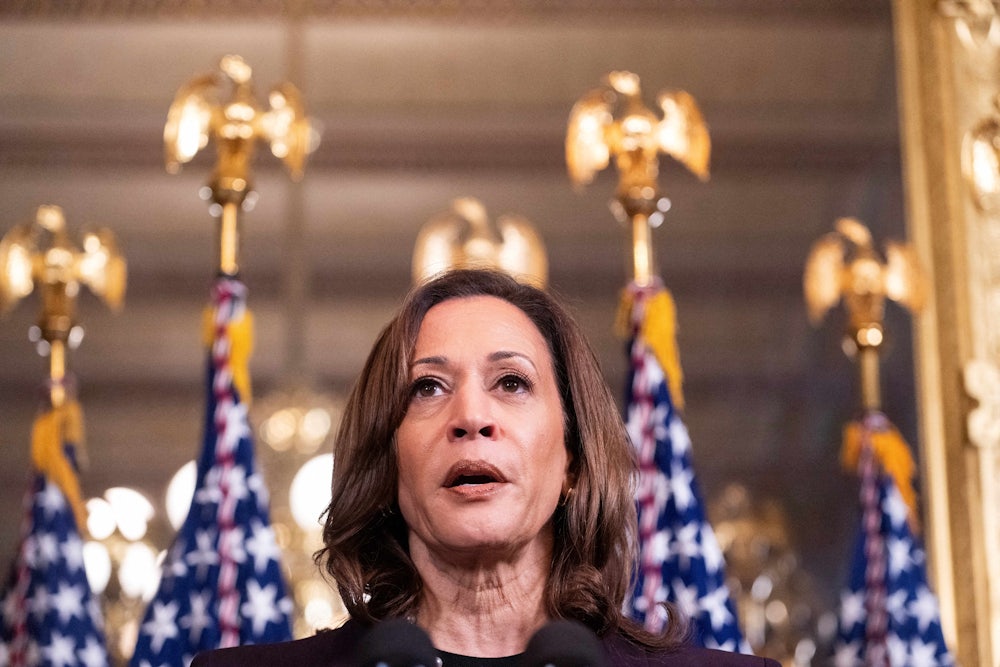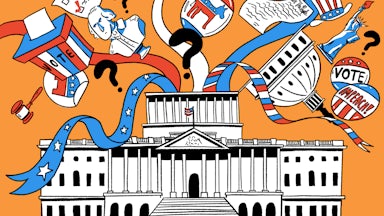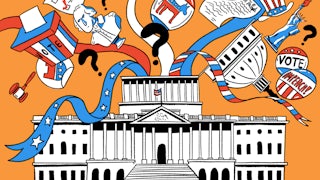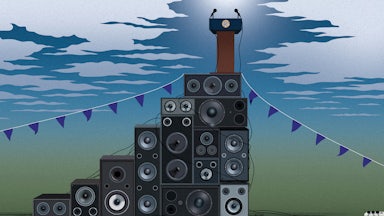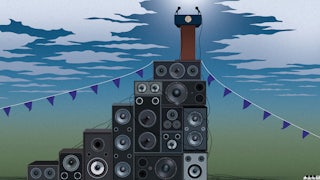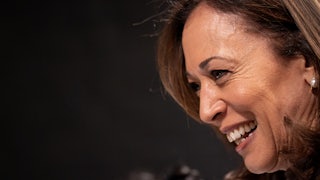In the week since President Joe Biden withdrew from the presidential race, the internet has been flooded with memes declaring Vice President Kamala Harris “brat.” Aside from baffling everyone not chronically online, the now-inescapable memes could prove to be a double-edged sword for Harris’s candidacy.
The meme itself refers to Brat, Charli XCX’s new album released in early June. The pop music singer herself fueled the furor for Harris Monday by tweeting, “kamala is brat.”
Brat is an energetic assembly of pulsing electronic beats, with silly and serious lyrics about complex friendship dynamics, inherited family trauma, and other decidedly cool girl ideas. The album is doing pretty well chart-wise, but certainly not well enough to garner the confused mentions on CNN and thousands of questions from liberal parents (including my own mom) to their Gen Z children. Even Fox News joined in, clunkily stating that having a “brat summer” means being “messy and bold.”
As it has turned out, fate has now aligned so that “messy and bold” has become convenient branding for the Democratic Party, as it scrambles to mount a presidential campaign for Harris at a moment’s notice. The memes are a sign of young people actually being excited for a candidate—but the jokes can just as easily come back to bite Harris if she’s not careful.
When the album was released—and before criticism of Biden had hit a postdebate fever pitch—internet users were fondly reminiscing over Harris’s quirky catchphrases about “coconut trees,” “Venn diagrams,” and “existing in the context.” Driven by the zeitgeist (the context in which we exist, if you will), college student Ryan Long posted a “fan-cam” edit of Harris to Charli XCX’s new song “Von Dutch.”
why did I stay up till 3am making a von dutch brat coconut tree edit featuring kamala harris and why can’t I stop watching it on repeat pic.twitter.com/hqcmerD1Pb
— ryan (@ryanlong03) July 3, 2024
That video went viral, launching a slew of similar edits on X and TikTok. As people started talking more about a potential Harris run, and continued to stream the album, the two concepts collided. And so, Kamala’s brat summer began.
Brat’s most popular song on Spotify, “360,” is about being an internet “it girl”—which could reasonably be any woman with the right fuck-it attitude—who has captured the cultural imagination. The chorus’s lyrics, “I’m everywhere, I’m so Julia,” refer to actress and producer Julia Fox, who has been totally inescapable on the internet ever since she first appeared on-screen in 2019’s Uncut Gems.
Is Harris not similarly inescapable in this exact moment? Is she not, for all intents and purposes, in addition to being a moderate Democratic politician and former prosecutor, sort of an internet it girl?
As “360,” “Von Dutch,” and the rest of the album have steadily risen in popularity and virality, so too has Harris slowly risen to the forefront of political and cultural conversation. The two have coalesced together to form something more ephemeral and powerful than they’d ever be apart: a meme. Her inherent hokeyness plays off Brat coolness in an ironic mélange.
Today, “brat” is shorthand for anything cool that young people like. The sheer number of Harris memes indicates a level of joy and excitement from younger voters previously unseen in this election (or any election, really). And Harris has been quick to capitalize on it.
Already, Harris’s team seems to be leaning hard into her meme-ability, and that includes her brat-tiness. The newly minted KamalaHQ account on X used the same font and lime green shade as Brat’s cover art for its banner photo, and Harris followed Charli XCX on social media following the singer’s nod.
“The thing about having a candidate people are excited about is that you can actually have fun and be creative on socials, because people are going to embrace it, rather than find it embarrassing,” Annie Wu Henry, a digital strategist who has worked with Democrats including Representative Alexandria Ocasio-Cortez and Senator John Fetterman, told The New Republic’s Grace Segers earlier this week. “People don’t want to feel bad about politics. They want to have fun, they want to enjoy, they want to be excited about a candidate. There can be creativity and community.”
But separately, on her X (formerly Twitter) account, Henry warned against taking the current groundswell of support for granted.
“Young folks are incredibly aware of the unique moment and momentum occurring. This excitement to vote FOR a ticket rather against the alternative is something many have not experienced,” she wrote. “But we are also warning that the continuation of this energy cannot be guaranteed.”
Like every internet trend, the joke will change—Brat summer is only a summer, after all, if even that. And when that happens, Harris will have to face the reality that maybe she’s just not that “brat” after all.
To see both the beneficial and detrimental effects of leaning into the memes, look no further than Harris’s current boss and predecessor on the Democratic ticket. When Biden first launched his presidential campaign, he was bolstered by a sense of hokeyness similar to Harris’s, like a fun older relative.
Part of that was due to being kept out of the spotlight during Barack Obama’s presidency, allowing people to project onto him as only the fun parts of his personality came to the surface.
One such projection was the “Diamond Joe” persona created by the satirical outlet The Onion, described as “the handsome guy who’s got it good but doesn’t take himself too seriously.” It made Biden seem approachable and harmless. But as his campaign took off, a former Onion editor released an essay regretting ever giving Biden such a boost.
“Instead of viciously skewering a public figure who deserved scrutiny, we let him off easy,” Joe Garden wrote in Vice in 2019.
During Biden’s presidency, he regularly relied on the “Dark Brandon” meme, which, rather than portray him as a leftist maverick, quickly came to demonstrate how a curdled joke can damage a presidency when its use falls out of step with the grim actions of an administration.
Earlier this year, Biden tweeted out a version of the meme after the Kansas City Chiefs won the Super Bowl, an event that some conservative conspiracy theorists had suggested the Democrats would rig to make way for an endorsement from Travis Kelce and Taylor Swift.
“Just like we drew it up,” Biden wrote over a picture of him with red glowing eyes, and his arms crossed.
Simultaneously, Israel launched a U.S.-backed assault on the city of Rafah in Gaza, where 1.5 million displaced Palestinians had been cornered by Israel’s monthslong offensive. The grossly timed meme only served to highlight Biden’s policy on Israel, which has been widely unpopular, particularly among young people.
And in late June, just hours before the debate that would become the death knell for a second Biden term, Biden posted a photo of himself holding a can of “Dark Brandon’s Secret Sauce,” a jab at Trump’s insistence Biden would be drugged into wakefulness during the debate.
But after Biden’s low-energy, faltering performance, many on the internet wondered why he hadn’t drunk that secret sauce after all.
Every cool meme must eventually suffer that slow dusk into outdated cringe. Despite the saturation of brat-tiness, when a politician leans too far into a meme, it puts a ticking clock on the joke’s actual coolness. By embracing brat summer, Kamala may actually destroy it.
For Harris, engaging young voters and maintaining their current enthusiasm will be more crucial than ever over the next 100 days.
Voters age 18 to 24 make up a significant 40 million potential votes in the upcoming election. In the two days following Biden’s endorsement of Harris, Vote.org saw a surge of 38,500 new voter sign-ups, most of whom were 34 and under. One recent poll found that Harris was leading Trump by 20 points among young voters, a significant edge and a seven-point increase from Biden.
Should all that support disappear, Democrats may find themselves in a similar spot to where they were with Biden: careening toward a second Trump presidency.
And the thing is, Harris obviously can’t coast on memes alone.
The memes of Harris rely on a few choice clips of gaffes, not political speeches. They were picked in the urgency to feel any sort of optimism about the upcoming presidential election, to hide away from the hyperpolitical discourse and the saturation of messages about a weakening Biden and existentially threatening Donald Trump. Many of Harris’s actual policy ideas haven’t yet hit the internet. That’s about to change.
The more the public hears from Harris, the less brat she will likely seem. The internet created Harris’s brat summer ironically, but now, it’s giving Harris and her campaign a likable brand and apparent fuck-it attitude that they ultimately haven’t earned.
For instance, Harris is sitting at an important inflection point on how she will choose to deal with the humanitarian crisis and hostage situation in Gaza and Israel’s deadly military campaign, which has killed nearly 40,000 people.
Biden’s steadfast support for Israel drove away many younger voters, and on Thursday, Harris risked doing the same when she condemned the “unpatriotic” protesters who gathered to oppose Israeli Prime Minister Benjamin Netanyahu’s address to Congress the day before.
Set off by optics concerns over entirely legal flag burnings, Harris has found herself on the same path as Biden, who refused to get behind pro-Palestinian advocates. Already, young people were expressing their profound disappointment.
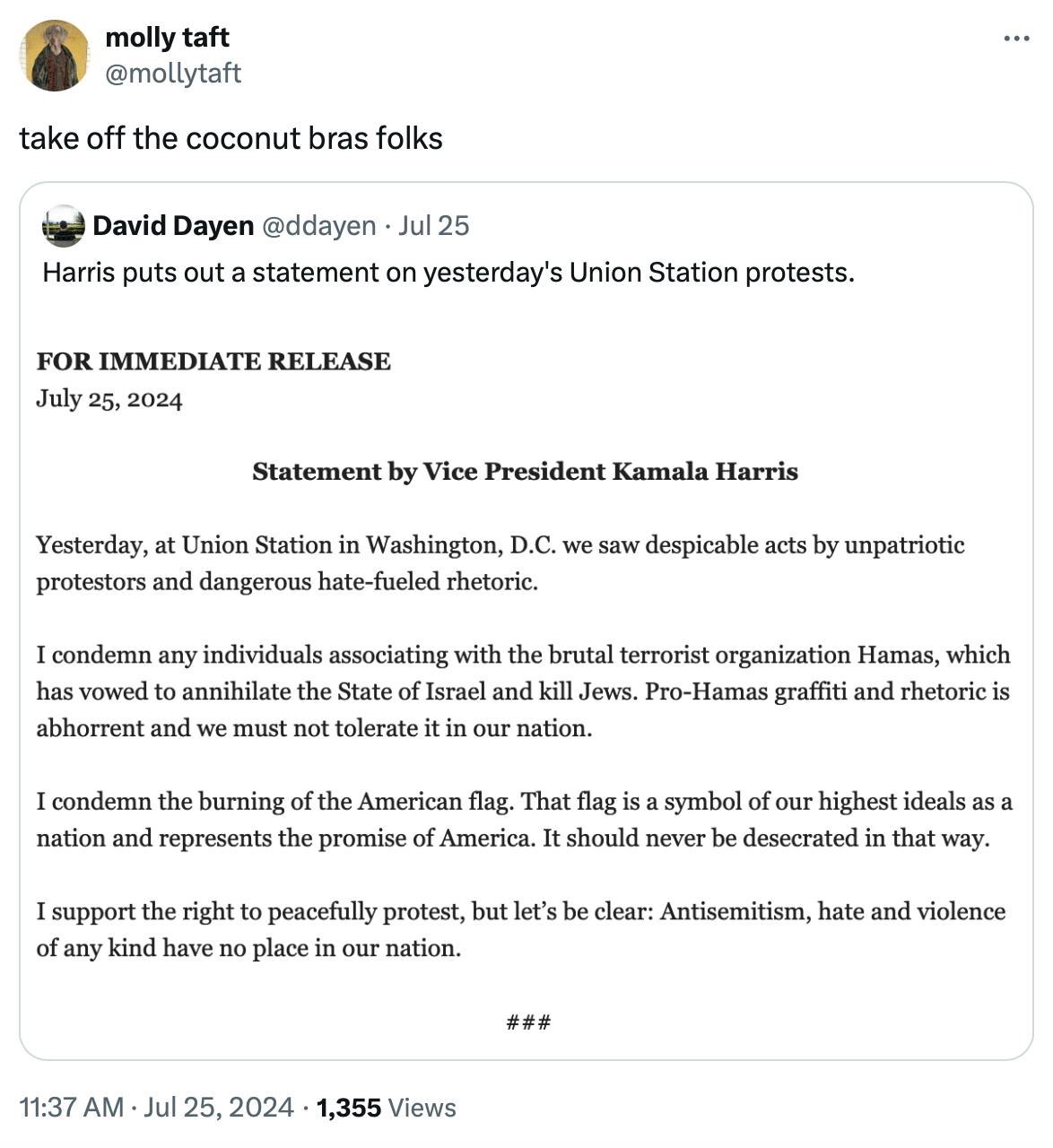
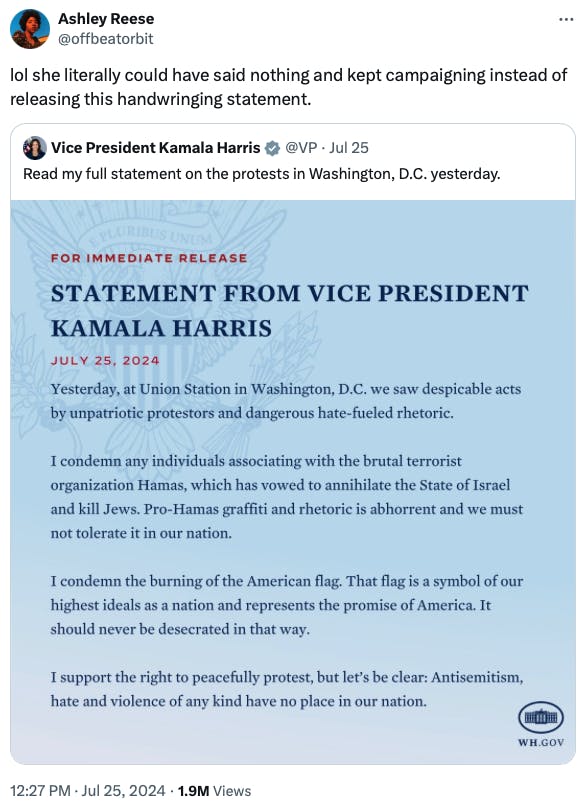
By the evening, there was some hope again. After speaking with Netanyahu herself, Harris insisted that “Israel has a right to defend itself, and how it does so matters.” Harris said she’d told Netanyahu about her “serious concern about the scale of human suffering in Gaza, including the death of far too many innocent civilians.”
“What has happened in Gaza over the past nine months is devastating. The images of dead children, and desperate, hungry people fleeing for safety, sometimes displaced for the second, third, or fourth time,” she said. “We cannot look away in the face of these tragedies. We cannot allow ourselves to become numb to the suffering, and I will not be silent.
“To everyone who has been calling for a cease-fire; to everyone who yearns for peace—I see you, and I hear you. Let’s get the deal done.”
While she put focus on the suffering of Palestinians and signaled a willingness to engage, Harris made no mention of plans to stop weapon shipments to Israel.
It would be a mistake for Harris to believe that the grassroots enthusiasm she has witnessed from young voters, or being crowned “brat,” is enough to keep young people on board with her candidacy. She herself acknowledged this on Friday.
“In this election, we know young voters will be key. And we know your vote cannot be taken for granted,” she said in a video message. “It must be earned, and that is exactly what we will do.”
Like a meme format, the image of Harris that existed online presented something of a blank slate on which one could project whatever they wanted. The less they knew, the better. This is precisely what made her the perfect fodder for memes, and a great candidate for the girl power movement that could be about anyone.
But soon, voters will demand more. And without a meaningful shift in rhetoric and action on issues such as Israel, her appeal will inevitably begin to shrink.
As Harris takes center stage, it’s becoming (as “Von Dutch” describes), “so obvious” that she’s Democrats’ “number one.” It remains to be seen if she can stay that way for everyone else she needs to win over.
